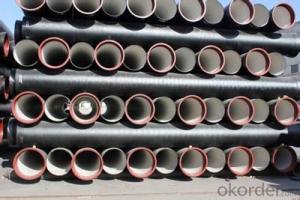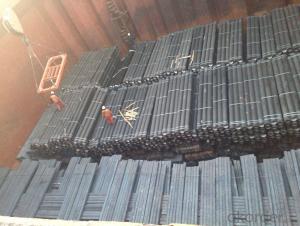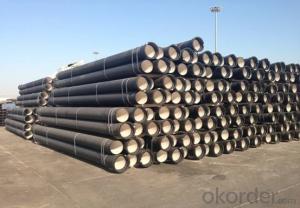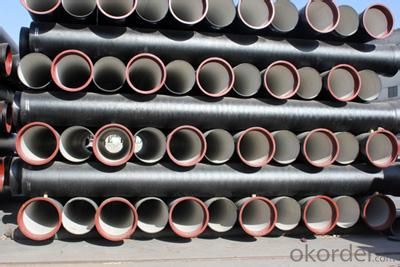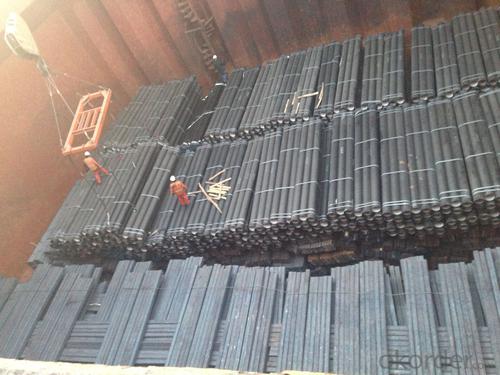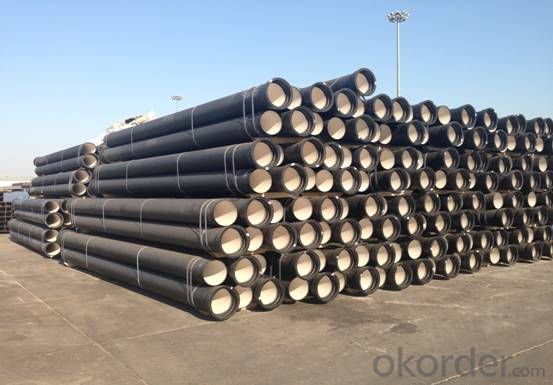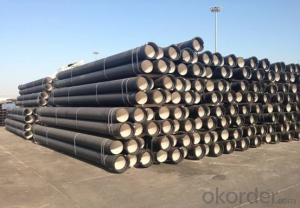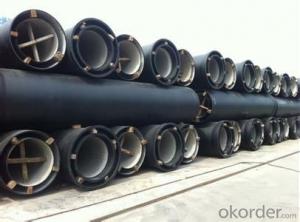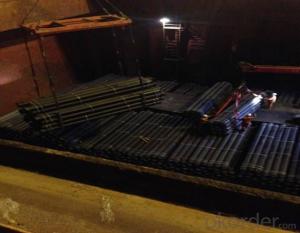DUCTILE IRON PIPE K8 DN600
- Loading Port:
- China Main Port
- Payment Terms:
- TT OR LC
- Min Order Qty:
- -
- Supply Capability:
- -
OKorder Service Pledge
OKorder Financial Service
You Might Also Like
Ductile Iron Cast Pipe is without any defects compare with tradition casting tech, which has many advantages particularly as follow:
(1) High density. In the "vertical upward casting" process, the melt iron of centre liquid column in center crystallizer is continuously feeding for volume shrinkage caused by condensation tube at outer circumference , which lead to be free of shrinkage porosity.
(2) High purity. When melt iron pouring, the mixed impurities such as gas, dross, sand grain which are lighter than melt iron could be eliminated at furnace mouth, its impossible to enter into the crystallizer through the channel, so the melt iron into the crystallizer is very pure.
(3) Strength with toughness. The cooling speed provided by continuous crystallizer is 30 times than sand casting and 5 times than centrifugal casting, and doesn't produce white iron, the eutectic cell volume of continuous cast iron is one eighth to one tenth compare with traditional cast iron. The density of graphite nodule in ductile iron can reach 300-700 pcs/mm2. Therefore, all reason above improve the strength and toughness of continuous cast iron.
(4) Free machining. The high speed cooling make the hardening phase (such as boride, steadite) not appear like reticular, massive or thick, but diffuse like fish bone and pane in shape, moreover, there are tiny graphite flakes inlaid hardening phase. It's free machining in BrinellHardness the range of 250-300HB. However, the Brinell Hardness of 250 is top limit to common metal materials.
(5) Uniform composition of tube wall. The convection mixing of liquid column caused by marching type drawing in crystallizer make the composition of tube wall well-distributed, and concentration gradient very little.
(6) High productivity. To the wall thickness of tube under 10mm, the speed of continuous casting is 1 meter/min, to the wall thickness of tube under 20mm, the speed of continuous casting is 0.5 meter/min, which is high efficiency that centrifugal or other casting tech couldn't reach.
- Q: Can ductile iron pipe be used for horizontal directional drilling?
- HDD, a trenchless method for installing underground utilities like pipelines, can indeed utilize ductile iron pipe. The choice of ductile iron pipe in HDD projects stems from its remarkable strength, durability, and ability to withstand the strains and stresses associated with directional drilling. It exhibits exceptional resistance to external loads and can endure the bending and pulling forces involved in HDD installations. Nevertheless, it is crucial to consider variables like pipe diameter, wall thickness, and soil conditions when selecting the appropriate pipe for HDD projects. Furthermore, it is imperative to adhere to proper installation techniques and take precautionary measures to ensure the long-term performance and integrity of ductile iron pipe in HDD applications.
- Q: Ductile iron pipes perennial bubbles in the water will rot it
- Ductile iron pipes mainly called centrifugal ductile iron pipe, it has the properties of nature, iron and steel, excellent corrosion resistance, good ductility, good sealing effect, simple installation, mainly for municipal, industrial and mining enterprises, water supply, gas, oil etc..
- Q: Can ductile iron pipe be used for both water and wastewater applications?
- Ductile iron pipe is versatile and can be used for water and wastewater applications. It is made by treating iron with small amounts of magnesium, resulting in a material that is both flexible and durable. This flexibility and durability make it suitable for transporting both water and wastewater. Its high strength and resistance to corrosion make it ideal for underground applications. Ductile iron pipes can handle the high pressures and varying flow rates commonly found in water distribution systems, as well as the corrosive properties of wastewater. In addition, they have a longer lifespan compared to other materials like PVC or concrete, which are commonly used for water and wastewater projects. Therefore, ductile iron pipes are often chosen for reliable and long-lasting water and wastewater transport.
- Q: How does ductile iron pipe perform in areas with high soil erosion?
- Ductile iron pipe is renowned for its remarkable strength and durability, rendering it a dependable option for regions experiencing extensive soil erosion. With its distinctive composition, including graphite nodules, it possesses the capacity to be both pliable and resistant to fractures or cracks, even in demanding environments. Consequently, ductile iron pipe is highly capable of enduring the impact of soil erosion. In regions with high soil erosion, the surface of the pipe can potentially be scraped by soil particles, leading to abrasions or damage. However, ductile iron pipe's substantial wall thickness and corrosion-resistant coating effectively serve as a barrier against these abrasive forces. Consequently, even in regions with considerable soil erosion, ductile iron pipe can maintain its structural integrity and functionality. Additionally, the ability of ductile iron pipe to resist corrosion further augments its performance in areas with high soil erosion. Soil erosion frequently results in increased moisture content, which can expedite the corrosion process for certain materials. Nonetheless, ductile iron pipe's protective coating, typically composed of zinc or epoxy, acts as a shield against corrosion, ensuring prolonged performance and reliability. To summarize, ductile iron pipe exhibits exceptional performance in regions with high soil erosion due to its strength, flexibility, and resistance to fractures or cracks. Its substantial wall thickness and corrosion-resistant coating make it highly durable against abrasive forces and corrosion, enabling it to withstand the challenges posed by soil erosion. Consequently, ductile iron pipe is a dependable choice for infrastructure projects in these areas, offering long-lasting and efficient water and wastewater transportation systems.
- Q: Can ductile iron pipes be used in acidic environments?
- Ductile iron pipes are capable of being utilized in acidic environments. These pipes possess a strong resistance to corrosion, rendering them suitable for a wide range of applications, including those involving acidic conditions. The heightened carbon content found in ductile iron pipes generates a shielding layer on the pipe's surface, effectively thwarting direct attacks from acid on the iron. Furthermore, the interior lining of the pipe can be coated with epoxy or other protective substances to bolster its resistance to corrosion in acidic settings. Nevertheless, it is crucial to take into account the precise concentration and type of acid present within the environment, as certain acids may still induce corrosion over time. It is highly recommended to seek counsel from professionals or manufacturers to ensure the appropriate selection of materials for specific acidic conditions.
- Q: How do ductile iron pipes handle cyclic loading in offshore applications?
- Ductile iron pipes handle cyclic loading in offshore applications quite effectively. The inherent flexibility and toughness of ductile iron allow it to withstand the repeated stresses and strains caused by cyclic loading, such as wave action or tidal forces. Additionally, the high fatigue resistance of ductile iron ensures that it can endure the continuous loading and unloading cycles without experiencing significant degradation or failure. Overall, ductile iron pipes are well-suited for offshore applications where cyclic loading is a common occurrence.
- Q: Can ductile iron pipe be used for wastewater treatment plant sludge dewatering?
- Ductile iron pipe is suitable for the dewatering of sludge in wastewater treatment plants. Its durability, strength, and resistance to corrosion make it a popular choice in these facilities. The pipes can withstand the harsh conditions and abrasive characteristics of the sludge dewatering process. Moreover, their leak-proof joints are essential in preventing any sludge leakage during dewatering. Furthermore, ductile iron pipes come in different sizes and are easy to install, making them a convenient option for wastewater treatment plant sludge dewatering.
- Q: Can ductile iron pipes be used for both water and sewer applications?
- Yes, ductile iron pipes can be used for both water and sewer applications. Ductile iron pipes are highly durable and have excellent resistance to corrosion, making them suitable for carrying both potable water and wastewater. They can withstand high pressure and are resistant to external loads, making them ideal for underground installations. Additionally, ductile iron pipes have a long service life and require minimal maintenance, making them a cost-effective choice for both water and sewer systems.
- Q: How are ductile iron pipes inspected for quality control?
- Ductile iron pipes are inspected for quality control through a series of rigorous tests and inspections to ensure their compliance with industry standards. One of the most common methods used is visual inspection, where trained inspectors examine the pipes for any visible defects such as cracks, pits, or surface irregularities. This helps in identifying any visual defects that may compromise the overall quality of the pipes. In addition to visual inspection, another crucial quality control measure is dimensional inspection. This involves measuring the dimensions of the pipes, such as diameter, wall thickness, and length, using specialized tools and equipment. By comparing these measurements against the specified tolerances, any deviations can be identified, and necessary corrective actions can be taken. Another important quality control step is hydrostatic pressure testing. In this test, the pipes are subjected to internal pressure that is higher than their intended operating pressure. This ensures that the pipes can withstand the required pressure without any leakage or failure. The test involves filling the pipes with water and gradually increasing the pressure, while closely monitoring for any signs of leakage or deformation. Furthermore, ductile iron pipes undergo various mechanical tests, such as tensile strength testing and impact testing, to evaluate their mechanical properties. These tests involve applying controlled forces or impacts to the pipes and measuring their response. By doing so, the strength, toughness, and durability of the pipes can be assessed, ensuring they meet the necessary requirements. Lastly, metallurgical examinations are conducted to analyze the microstructure of the ductile iron pipes. This involves taking samples from the pipes and using microscopy techniques to examine the grain structure, phase distribution, and any potential defects at a microscopic level. This helps in identifying any issues that may not be visible to the naked eye but could affect the overall quality of the pipes. Overall, the inspection process for ductile iron pipes involves a combination of visual, dimensional, hydrostatic, mechanical, and metallurgical tests. These quality control measures help ensure that the pipes meet the required standards, providing reliable and durable infrastructure for various applications.
- Q: Are ductile iron pipes suitable for use in brewery facilities?
- Yes, ductile iron pipes are suitable for use in brewery facilities. Ductile iron pipes are durable, corrosion-resistant, and can withstand high-pressure applications, making them ideal for transporting water, steam, and other fluids within brewery facilities. Additionally, the smooth interior surface of ductile iron pipes minimizes friction and prevents the build-up of sediments or organic materials, ensuring the purity and quality of the beer being produced.
Send your message to us
DUCTILE IRON PIPE K8 DN600
- Loading Port:
- China Main Port
- Payment Terms:
- TT OR LC
- Min Order Qty:
- -
- Supply Capability:
- -
OKorder Service Pledge
OKorder Financial Service
Similar products
Hot products
Hot Searches
Related keywords
